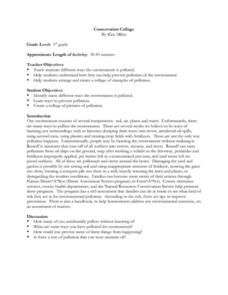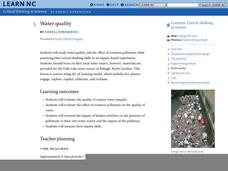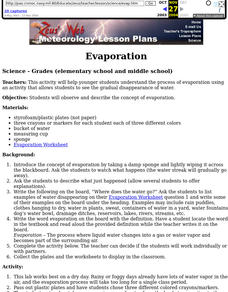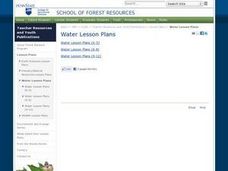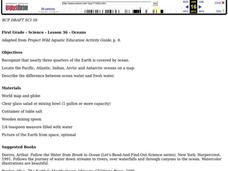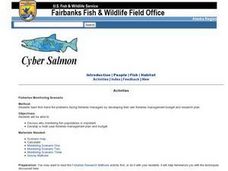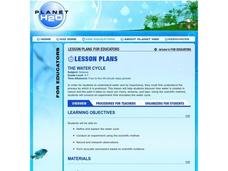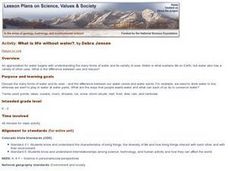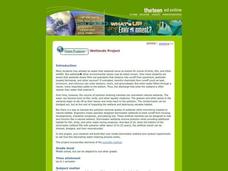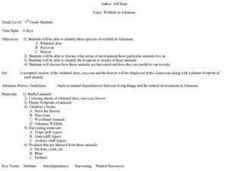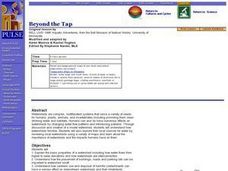Curated OER
Testing the Waters
Students study the quality of water by running chemical tests on the water. First, they measure pH, temperature, phospates, and nitrates in tap (drinking) water and an outdoor water sample. Then they post and evaluate the results of...
Curated OER
Water Walk
Learners conduct a visual survey to discover information about local land use and water quality; document their findings by mapping and profiling the water body; and use this initial investigation to raise questions about local land use.
Curated OER
Drop in the Bucket
Students study the sources for the water they use. They determine their town's major water supply and how many gallons per day does the population use.
Curated OER
Conservation Collage
Learners identify many different ways the environment is polluted, and determine ways to prevent pollution. They create a collage of pictures describing how the earth becomes polluted.
Curated OER
Water Quality
In this unit of lessons, students examine the quality of water. They create poems and make observations about the quality of water. They also examine hot spots and the quality of water in the Great Lakes.
Curated OER
Water Pollution Graphing Activity
Young scholars describe and identify the link between land use activities within a watershed and water quality. They evaluate the quality of a "water sample" ( a bag of skittles), graph their results, and form a hypothesis about the land...
Curated OER
Evaporation
Learners explain the process of evaporation using an activity that allows students to see the gradual disappearance of water.
Curated OER
"Pennsylvania Watersheds, Many Ways to the Sea"
Students trace a molecule of water through the water cycle including each of its three loops. They describe why evapotranspiration demands the largest portion of total precipitation falling on a forested watershed.
Curated OER
Oceans
First graders recognize that nearly three quarters of the Earth is covered by ocean. They locate the Pacific, Atlantic, Indian, Arctic and Antarctic oceans on a map. They describe the difference between ocean water and fresh water.
Curated OER
'Water, Water Everywhere...'
Fourth graders explore how the Utah pioneers used irrigation to make the desert 'blossom as a rose'. They use geographical tools to analyze political and physical features of Utah, the United States, China, and Asia.
Curated OER
Fisheries Monitoring
Pupils discuss why monitoring fish populations is important. They develop a multi-year fisheries management plan and budget.
Curated OER
The Water Cycle
Students research the water cycle and identify main vocabulary associated with the water cycle. They build and observe a closed system model that demonstrates the water cycle in action.
Curated OER
The Water in Our Lives: Kit Practice
Students examine a local water source using testing kits to determine water qualitiy. They identify the pollutants and contaminants in each sample. They determine if samples fall within an acceptable range for drinking water.
Curated OER
Is it Partly Cloudy or Partly Sunny?
Students investigate the concept of weather and how it is created. They review relevant vocabulary related to weather. Students predict weather given slight background knowledge. The lesson includes background information for the...
Curated OER
What is Life Without Water?
Students differentiate between how they use water in response to a need and how they use water for pleasure. They read books about water, participate in class discussion and illustrate their observations.
Curated OER
From Ground to Water
Students explore groundwater and issues relating to groundwater. They discus the problems involving groundwater. Students write a newspaper story addressing groundwater problems. They create a comic strip addressing groundwater...
Curated OER
The Effect of Medications on Daphnia
Students explore how human beings affect the world's ecosystem by examining the affects of medication on daphnia, a small freshwater organism very sensitive to pollution. Students use a computer model to repeat the experiment and analyze...
Curated OER
Wetlands Project
Students discover how wetlands filter out contaminants before they can reach other bodies of water. In groups, they design and build a model of a stormwater wetland. They test the water quality and inform their classmates about the...
Curated OER
The Inside Current
Eighth graders explore ocean currents and wind patterns. They discover the concept of systems to show how change in one component of a body of water, causes change in other components in that system. Students describe positive and...
Curated OER
Wildlife in Arkansas
First graders identify three species of wildlife in Arkansas. They discuss the environment in which the whitetail deer, raccoon, and beaver live in. They identify the footprints of each animal and discuss how the animals are harvested...
Curated OER
Beyond the Tap
Students explain the basic properties of a watershed including how water flows from higher to lower elevations and how watersheds are interconnected. They comprehend how the placement of buildings, roads, and parking lots can be...
Curated OER
The Driving Force
Students work in groups and note similarities and differences between their boats: size, shape, color, and unique features. They discuss 3 typical means of propulsion: propellers, sails, and paddles then share their charts with the class.
Curated OER
Where is Water Found?
Fourth graders examine the amount of water and its distribution on Earth. As a class, they brainstorm a list of where water can be found and classify the places according to salt water, fresh water or glaciers. They estimate how much...
Curated OER
Hydrologic Cycle
In this science worksheet, students examine the hydrological cycle through the coloring of the picture that graphically organizes the concept.
Other popular searches
- Streams and Rivers
- Create Rivers and Streams
- Rivers and Streams Fl
- Rivers and Streams Lab
- Rivers and Streams Biomes
- Streams Rivers
- Rivers and Streams Bio Mes





